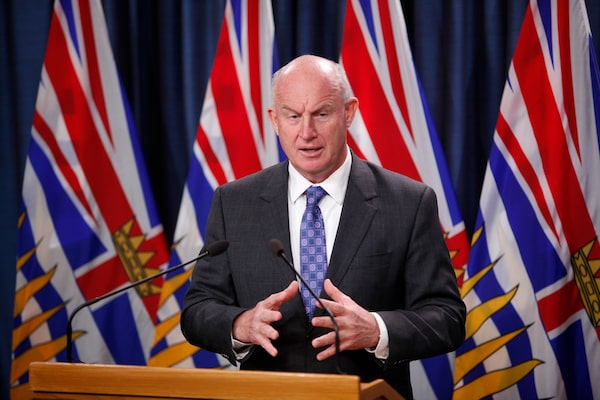
Solicitor-General Mike Farnworth announced the B.C. cap on Tuesday, saying the new measure comes into effect on Dec. 27 and will continue until three months after the provincial state of emergency is lifted.CHAD HIPOLITO/The Canadian Press
The B.C. government is temporarily capping food-delivery fees charged to restaurants at 15 per cent, down from about 25 per cent to 30 per cent, in a bid to help a sector facing pandemic-related challenges.
The announcement follows a similar measure in Ontario, where the provincial government last week capped such fees at 20 per cent through legislation entitled the Supporting Local Restaurants Act. Various U.S. jurisdictions have also put a limit on the fees that delivery apps and services charge restaurants.
Solicitor-General Mike Farnworth announced the B.C. cap on Tuesday, saying the new measure comes into effect on Dec. 27 and will continue until three months after the provincial state of emergency is lifted.
Not long after his announcement, the province said the state of emergency, enacted on March 18, will be extended to the end of the day on Jan. 5, 2021.
The restaurant cap is being enacted under an Emergency Program Act order. Mr. Farnworth said the government is responding to a call for significant help from the restaurant sector in B.C.
“They see this as being an important step in helping the industry not only stabilize, but in terms of them being able to survive and get through this pandemic.”
Customers won’t likely see any differences in the total cost of their orders, as the fees are between the services and restaurants.
Ian Tostenson, president and chief executive officer of the BC Restaurant and Food Service Association, said the move will help restaurants that are struggling with fewer customers, less lunch business and, now, the absence of Christmas parties.
The commission rates of 25 per cent to 30 per cent, he said, squeezed profits and challenged restaurants to make ends meet. But by capping fees temporarily, he said, restaurants may be able to hold on to a few helpful dollars from each order.
According to figures released by the government with Tuesday’s announcement, B.C. employment in food services and drinking places dropped 25 per cent to 150,260 jobs in September compared with September, 2019.
BC Liberal MLA Trevor Halford said he supports the province’s move.
“There’s never a wrong time to do the right thing,” the opposition member for Surrey-White Rock said in an interview. “I believe that this is something that could have been done quite a while ago to give relief to a sector that was struggling, but I definitely welcome today’s announcement.”
He noted he had put forward a private member’s bill suggesting the idea, with the 15-per-cent cap some time ago.
“They always need to be looking at ways they can support the industry. This is an industry that has been absolutely decimated since the beginning of the pandemic,” he said. “This is a good first step.”
Melanie Fatouros-Richardson, a spokesperson for delivery service SkipTheDishes, said the Winnipeg-based company is reviewing the B.C. move.
The BC Federation of Labour said it supported the cap, but that it is concerned delivery companies may try to make up the difference by reducing compensation to workers.
“This is an important first step for workers,” secretary treasurer Sussanne Skidmore said in a statement. “We look forward to working with the BC NDP government as they take steps to develop their precarious-work strategy.”
We have a weekly Western Canada newsletter written by our B.C. and Alberta bureau chiefs, providing a comprehensive package of the news you need to know about the region and its place in the issues facing Canada. Sign up today.
 Ian Bailey
Ian Bailey